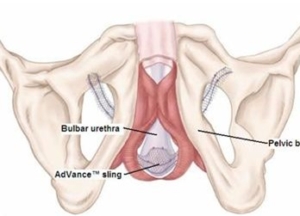Male Advance Sling
For those guys who suffer persistent low-intermediate grade of stress urinary incontinence after their radical prostatectomy for prostate cancer. Usually 2 level 2 pads per day.

Why is it done?
- Male Stress incontinence
- Usually after a TURP/TUVP, Radical Prostatectomy in 2% of cases.
How is it done?
- This procedure is done under a spinal / general anesthetic, as decided by the anesthetist.
- The legs will be elevated into the lithotomy position.
- A 5-7cm incision is made on the perineum (space between scrotum and anus).
- The sling is placed around the bulb of the penis.
- The arms of the sling are brought to the skin at the inner thigh, with a small incision.
- The sling is placed with descent tension, pulling the bulb inwards by at least 2 cm.
- The bladder will be inspected with a cystoscopy to exclude any injuries to the bladder wall and urethra.
- The wounds are closed with dissolvable sutures.
- A local anesthetic is given for pain relief.
- A urinary catheter is placed for 24hrs.
- The catheter will be removed early the next morning.
- The patient’s post void residual volume will be measured. (Patients will be required to do this up to 3 times.)
- If the residual amount of urine is more 250-300 cc the patient may have to self-catheterize, until the residual volume is acceptable.
- You may require an indwelling catheter for 7 days.
- Prophylactic antibiotics will be given to prevent infection.
What to expect after the procedure?
- Any anesthetic has its risks, and the anesthetist will explain all such risks.
- Complications: hemorrhaging, requiring blood transfusion <1%.
- Patients will wake up with a catheter in the urethra and bladder. This will remain in the bladder for 24 hrs.
- Inner thigh discomfort/pain will persist for a few days but this will subside / settle.
- If you cannot urinate after 2-3 attempts, the catheter may be replaced for a further 7 days
- You may be required to self catheterize for a week or two.
- If there is no improvement the sling may be cut, to allow spontaneous urination
- This may only be 50% effective in irradiated patients
- NB! Each person is unique and for this reason symptoms may vary!
Download Information Sheet

Leave a Reply
Want to join the discussion?Feel free to contribute!